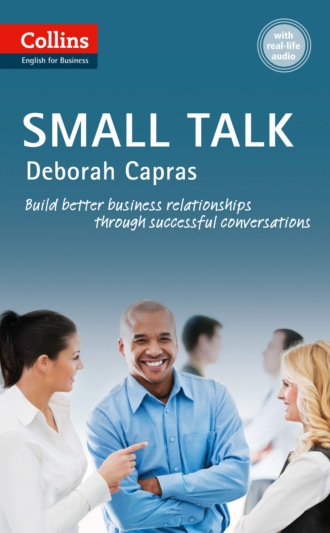
Полная версия
Small Talk: B1+
You don’t need a large vocabulary to make a good impression during your first introduction. Make sure you can use the key phrases in this chapter so that you have the confidence to talk to people at business and social events.
To help you to prepare, write the phrases that you would like to use on separate cards. On the back of the cards, write key words from the phrases.
For example:
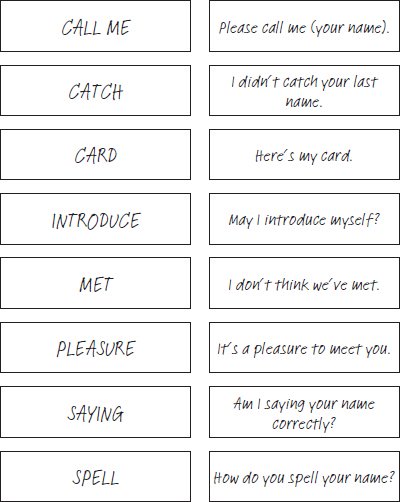

2 Old Contacts

My goals
• Greet people I’ve met in the past
• Greet people I haven’t seen for a long time
• Politely admit that I don’t remember someone
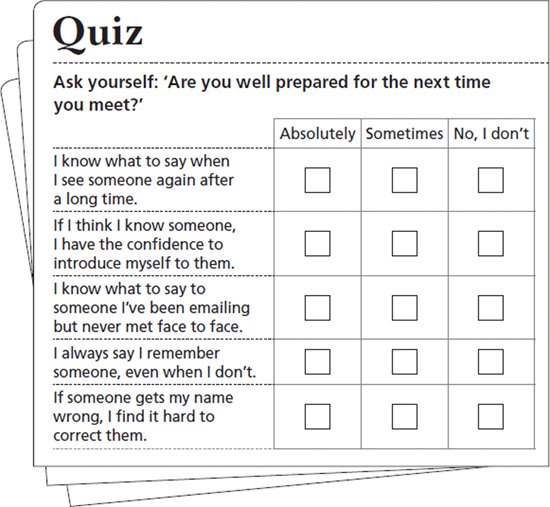
In business your first face-to-face contact with someone might come after you have already communicated with that person by email, by phone or even through social media networks. If you have worked in the same industry for a while, you will often meet the same people again and again – sometimes after long periods. The way you greet these people will be different from the way you greet a stranger. It is a good idea to remind them of your relationship.
Key phrases
Meeting someone you know unexpectedly
It’s Katsumi, isn’t it? I’m Sue Jones. We met last May.
You’re Katsumi, right? Sue.
Meeting someone you know after a long time
Long time no see! / How are you/things? / How have you been?
Responding
That’s right.
I’m great/good. How about you?
Good to see you again.
Meeting someone you ‘know’ but have never met
You must be Paul. I recognize you from your website.
You must be Paul. I recognized your voice immediately!
It’s so great/good/nice to finally meet you.
(It’s) great/good/nice to meet you at last.
I can’t believe we haven’t met before.
Admitting you don’t remember someone
I’m sorry, but can you jog/refresh my memory?
I’m really sorry, but what was your name again?
I’m sorry. Where was it we met?
Correcting someone if they get your name wrong
Actually, it’s Mark.
Actually, I don’t think we’ve met.
Apologizing
I’m sorry. I remember now. How could I forget!
Oh, I’m so sorry! I thought you were someone else.

Scenarios
Mary: It’s Katsumi, isn’t it? Mary. We met last May.
Katsumi: I’m sorry, but can you jog my memory?
Mary: Mary Smith. We met at the conference in Brighton. I used your mobile phone when my battery ran out.
Katsumi: Oh, Mary! Of course. I’m sorry. How could I forget! You used it to call friends in Australia.
Mary: I called a taxi!
Katsumi: Just kidding. It’s good to see you again. How are you?
Mary: I’m good, really good. How about you?
Paula: Hi. You must be Ghada.
Ghada: That’s right.
Paula: I recognize you from your photo on the website. I’m Paula, from Marketing.
Ghada: Paula! Of course. It’s so good to finally meet you. How are things?
Paula: Great. I can’t believe we haven’t met before.
Ghada: Me neither.
Beate: You’re Martin, right? Beate. From Switzerland.
Mark: Actually, it’s Mark. I don’t think we’ve met.
Beate: Oh, I’m sorry! I thought you were someone else.
Mark: No problem. Anyway, it’s nice to meet you. I’m Mark Jones.
Beate: Beate Schmidt.

Over to you
1 Put the words in the correct order to make useful expressions. Don’t forget to add punctuation.
1. time / see / no / long
....................................................................
2. see / good / you / again / to
....................................................................
3. have / you / how / been
....................................................................
4. to / so / you / meet / good / it’s / finally
....................................................................
2 Complete the questions with the words in the box.

1. You’re Katsumi,.........................?
2. How are.........................?
3. How have you.........................?
4. How.........................you?
3 There is one word missing in each of the expressions below. Rewrite the expressions with the missing word in the correct position.
1. I’m sorry. How I forget!
....................................................................
2. I thought you were someone.
....................................................................
3. I can’t we haven’t met before!
....................................................................
4. I’m sorry, but can you my memory?
....................................................................
4 The following exchange did not go well! Rewrite it to make it more polite.
Paula: It’s Jonathan, right?
John: No, not Jonathan. John.
Paula: I’m Paula Reed. We met at the conference in Hong Kong.
John: I don’t remember you.
Paula: We sat next to each other at the dinner.
John: It’s possible.
Paula: It’s good to see you again.
John: Is it?
Try again, John.
Paula: It’s Jonathan, right?
John: ..........................................................
Paula: I’m Paula Reed. We met at the conference in Hong Kong.
John: ..........................................................
Paula: We sat next to each other at the dinner.
John: ..........................................................
Paula: It’s good to see you again.
John: ..........................................................
5 Complete the dialogues with key phrases.
1 A: You’re Rio, right?
B:............................................................
A: Oh, I’m sorry. I thought you were someone else.
B:............................................................
2 A: Hi. You must be (your name).
B:............................................................
A: I recognized you from the website.
B:............................................................
A: I’m Ioannis Papandreou. From Finance.
B:............................................................
Language focus: ‘Remember’ or ‘remind’?
The verbs remember and remind may come in useful when you meet someone you know. Do you know the difference?
Remember
● If you remember people, events or things, you know them. You have an idea of them in your mind and are able to think about them.
I’m really sorry, but I can’t remember your name.
● Remember is followed by the -ing form of the verb when you talk about things you did in the past.
Oh yes, I remember talking to you in Prague.
Remind
● If you remind someone about something, you make that person remember it.
Could you remind me again where we met?
● If you say that someone reminds you of another person or thing, you are saying that they are similar to them.
You remind me of a colleague of mine.
Idiomatic language
For non-native speakers, idiomatic language can be difficult to understand. Listen out for idiomatic greetings and notice how people generally respond. At first, you may not feel confident enough to use such expressions, but you should expect to hear them and be able to react to them.
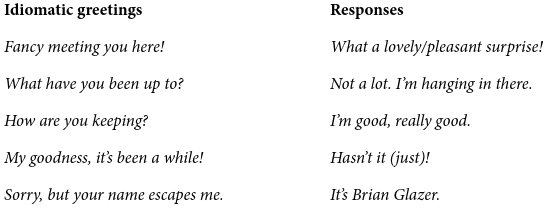
Scenario
Brian: Fancy meeting you here, Louise!
Louise: Brian! What a pleasant surprise! Long time no see! Gosh, how long has it been?
Brian: Too long! At least a year. What have you been up to?
Louise: Not a lot, really. What about you?
Brian: Oh, hanging in there, you know.
Tips: Reconnecting with people
If you have already been in contact with people, you need to reconnect with them when you meet face to face. Here are some tips.
Do’s
● Say your name – in case they don’t remember it.
● Shake the person’s hand. If you know the person reasonably well, double-cheek kisses are common between women. However, men should wait for a woman to signal that kisses are OK.
● Make the first move if you think you know someone. If you are right, you will make someone feel good. If not, you will make a new contact. You have nothing to lose!
Don’t’s
● Don’t worry if you have forgotten someone’s name. Instead, try to recall a few details about your last meeting; this will make your forgetting the name less impolite. And do ask them to remind you of their name. If you avoid using their name altogether, it might be obvious that you have forgotten it.
● Don’t forget to say how you know the person. If it is a surprise meeting, they may need a polite reminder.
● Don’t feel bad if someone doesn’t remember meeting you before. It happens.
Next steps
Have you ever thought about how you like to learn? Do you like to work with visuals such as pictures or videos? Do you learn better when you listen to new language? Or do you need to do something active to learn? It is a good idea to try out a variety of learning styles and find what works for you. Here are a few suggestions.
● When you write down the language you would like to learn, use pens of different colours to highlight difficult words or expressions.
● Draw pictures to help you to remember vocabulary. Or imagine a situation where you could use the vocabulary and visualize the scene. Where are you? What are people wearing? How are they standing?
● Listen to the audio recordings of key phrases and scenarios online. As you listen, pause the recording and repeat the phrases.
● Record yourself on your smartphone. Listen to yourself and think about how you speak. Are you too fast or too quiet? Do you sound enthusiastic or bored? Be honest!
● Write vocabulary and key phrases on cards and keep them on your desk. Use two cards for each key phrase. Write half a phrase on one card and the rest of the phrase on another card. Then play ‘Memory’ during your coffee break. Put all the cards face down on a desk. Turn over one card and then turn over a second card. Do they make a key phrase? If they do, keep them. If they don’t, turn them both over, shuffle the cards and start again.
● Learn vocabulary while you are travelling. Buy different coloured envelopes for your vocabulary cards. Put the cards with the vocabulary you don’t know in a red envelope, the vocabulary you aren’t sure of in a yellow one and the vocabulary you know well in a green one. Move the cards to different envelopes as you learn the vocabulary.
● Write key phrases on pieces of paper and stick them on the fridge in your kitchen.

3 Start networking

My goals
• Strike up conversations at conferences
• Respond to strangers who greet me
• Become more confident at making the first move
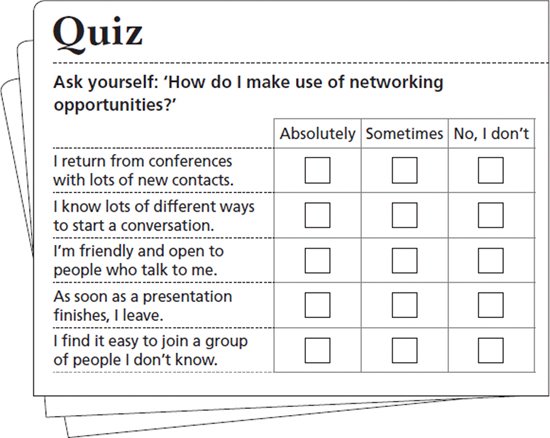
Conferences, trade fairs and events are the perfect places to network. The people you meet there may be able to help you and your business in the future – and you may be able to help them too. But it can only happen if you strike up conversations with strangers. This can be scary at first, but this chapter provides you with the language you need to do this, together with helpful tips and advice.
Key phrases
In the exhibition hall
Is this the first time you’ve been to this conference/trade fair?
Are you giving a talk later? I think I recognize you from the programme.
Are you waiting to go into the workshop/presentation?
The venue/atmosphere is amazing/great/outstanding, isn’t it?
The weather here has been fantastic/terrible, hasn’t it?
After a presentation or workshop
(That was a) good/great/nice session. I got a lot out of it.
That was thought-provoking/entertaining/impressive.
The keynote speaker certainly gave me some food for thought.
He/She made some valid points, don’t you think?
He/She knows his/her stuff. I was impressed.
It’s been a long day.
In the break
Hi. Is this seat taken?
(Do you) mind if I join you?
Hi there. Is there room for one more at this table?
Responses
Absolutely. / Exactly.
I know what you mean. / I agree. / That’s so true. I know exactly how you feel. / I know the feeling.
No, it’s free. Please join us. / Not at all. Please do.
Of course/Sure. Take/Have a seat.
Giving your name
I’m Dana Dardari, by the way.
By the way, my name’s Peter. Peter Graham.

Scenarios
Nasir: Well, the keynote speaker certainly gave me some food for thought.
Breda: She was impressive – and she knows her numbers.
Nasir: Definitely. I loved her accent. She’s Irish, isn’t she?
Breda: Yes, she is. And so am I.
Nasir: I thought so. Are you giving a talk later? I think I recognize you from the programme.
Breda: Yes, I am. My session is at two.
Nasir: Oh! I’m going to it. I’m Nasir Mazhar, by the way.
Breda: Breda Houlihan. It’s nice to meet you, Nasir.
Lesia: Mind if I join you? The other tables are full.
Charlotte: Of course. I’ll just move my bag for you.
Lesia: Thanks. I’ve been on my feet all day!
Charlotte: I know the feeling. I left home at four this morning.
Lesia: That is early. So you’re not from Edinburgh.
Charlotte: No, no. I’m from Avignon.
Lesia: That’s such a beautiful place! I’m Lesia, by the way.
Frank: Hi there. Is there room for one more at this table?
Holger: Of course. Please join us.
Frank: I really need a coffee. I’m running out of energy.
Holger: I know what you mean. It’s been a long day. Just one more session.
Frank: I feel sorry for the presenters who have the last one.
Holger: Well, the organizers put the best speakers in the last session, so actually, I feel sorry for us.
Frank: That’s so true. By the way, I’m Frank.

Over to you
1 Match the questions with the correct polite responses.

2 Longer responses sound better. What can you add to make the responses in exercise 1 friendlier?
1. Of course....................................
2. Yes, it is....................................
3. No, it’s free....................................
4. Not at all....................................
3 What can you say to start a conversation? Match the sentence beginnings with the sentences endings.

4 Complete the words in the sentences.
1. This v _ _ _ e is great.
2. The at _ _ _ _ _ _ _ e is amazing, isn’t it?
3. The k _ _ _ _ _ e speaker was good, wasn’t she?
4. She certainly gave me some food for th _ _ _ _ t.
5 Choose the correct word.
1. Her presentation was impressive / impressed.
2. She made some valid / correct points.
3. His talk was really interested / interesting.
4. The weather here has been impressed / terrible, don’t you think?
5. It’s been a(n) outstanding / valid event.
6 What can you say to show that you agree with someone? Put the words in the correct order. Don’t forget to add punctuation.
1. I / what / know / mean / you
..................................................................
2. feeling / the / know / I
..................................................................
3. feel / how / know / you / I / exactly
..................................................................
4. true / so / that’s
..................................................................
7 Complete the dialogue.
Frank: Hi there. Is there room for one more at this table?
You: (1) (Respond in a positive and friendly way.)
.............................................................................
Frank: I really need a coffee.
You: (2) (Respond and then make a comment about the last presentation.)
.............................................................................
.............................................................................
Frank: Absolutely! It certainly gave me food for thought.
You: (3) (Agree in a friendly way and then make a comment about the venue.)
.............................................................................
Frank: Yes! It’s much, much better than last year.
Language focus: Tag questions
Tag questions are very useful when you want to strike up a conversation. We use them if we expect someone to agree with what we are saying. They make the listener feel like they have something in common with the speaker. They are easy to respond to and can lead to longer conversations.
We make tag questions by adding question tags to statements. If the statement has a positive verb, we use a negative question tag. Here are some common tag questions that can be used to strike up a conversation.
The food here is great, isn’t it?
(It’s a) great venue, isn’t it?
(It was an) interesting programme, wasn’t it?
(This is an) amazing place, isn’t it?
Horrible/Lovely weather, isn’t it?
(It’s) busy, isn’t it?
In small talk try to respond in a positive way whenever possible. It is best to answer with more than just ‘Yes, it is’. Try to make a further comment so that the conversation can flow more easily.
A: Horrible weather, isn’t it?
B: Yes, it’s much worse than I expected.
A: Interesting programme, isn’t it?
B: Very. There are so many talks I’d like to go to.
A: Long line, isn’t it?
B: Yes. The coffee must be good!
If the statement has a negative verb, we use a positive question tag.
A: It isn’t very busy, is it?
B: No, it isn’t. I expected more people to be here.
Remember this! Body languageHow can you be successful at starting a conversation with someone you don’t know? Pay attention to people’s body language before you start talking to them. Are they smiling? Are they looking around the room? Are they making eye contact with you? If the answer is ‘yes’, they may be easy to talk to. On the other hand, if they are looking down at their feet or standing alone, apart from other people, they may be more difficult to talk to. Remember, people may be asking the same questions about you. If you have the right body language, people will come up and talk to you too.
Language focus: ConferencesHere are some basic terms to talk about conferences and trade fairs.
● attend (a presentation): This is the first time I’ve attended a workshop on social media.
● cloakroom/restroom: Do you know where the cloakroom is? I’d like to leave my bag there.
● delegate: This is my first time here as a delegate.
● elevator/lift: I hope there’s a lift. The next talk is on the fourth floor.
● exhibit hall: I’m looking for the exhibit hall. Is it down this way?
● exhibitor: We might register as exhibitors next year.
● keynote speaker: The keynote speaker was impressive, wasn’t she?
● main auditorium: Is this the way to the main auditorium?
● panellist: The panellists are clearly experts on computer viruses.
● presenter: I thought the presenter made some useful points.
● session: The last session is usually the most interesting one.



